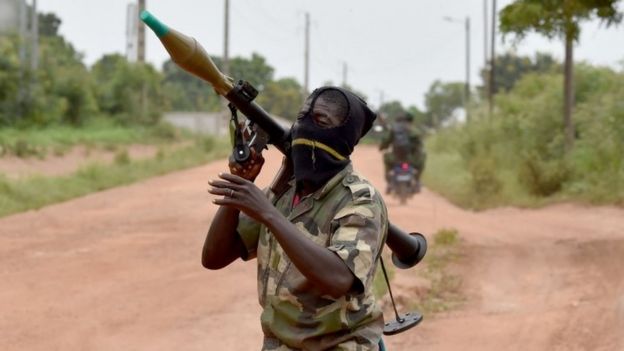The Ivory Coast government says it has reached a deal with soldiers involved in a four-day revolt over pay.
Defence Minister Alain-Richard Donwahi appeared on state TV to announce a settlement had been reached.
But only minutes later two spokesmen for the rebels told Reuters there was no agreement. Mr Donwahi gave few details of the accord.
The dispute, over what the mutineers say are unpaid bonuses, began on Friday and spread through major cities.
Defying a government order to lay down their weapons, the soldiers opened fire in four cities on Monday.
Shots rang out near the presidential palace in the main city, Abidjan, the second city, Bouaké, and in areas vital to the cocoa industry.

The mutineers helped the president take office in 2011. The former rebels make up about 8,400 of Ivory Coast’s 22,000-strong army.
Announcing the putative deal, Mr Donwahi said: “After talks, an agreement has been reached on ways of ending the crisis.
“As a result, we appeal to all soldiers to free up the corridors (town entrances), return to barracks and respect peace”.
Rejecting the latest government announcement, two spokesmen for the rebel soldiers told Reuters they wanted more money.
One, Sgt Seydou Kone said: “They proposed five million CFA francs (each) to be paid tomorrow. But we want seven million to be paid in one payment and immediately.”
It is unclear how many of the soldiers the men are representing.
Pro-government forces had backed off from advancing towards Bouaké, the epicentre of the mutiny, apparently because they want to avoid a fight, the BBC’s Tamasin Ford reported earlier from Abidjan.
On Sunday, armed forces’ chief of staff General Sékou Touré vowed to end the mutiny, but the mutineers said they would fight back if loyalist troops intervened.
Mutineers at the army headquarters in Abidjan’s financial district, near the presidential palace, had been shooting in the air, forcing schools and offices to shut, our reporter says.
Gunfire was also heard at the Akouédo barracks, in a suburb where many middle-class Ivorians and expats live, she says.
Pro-government forces responded by closing roads in the city, while French troops were deployed to guard French-owned transport firm Bolloré, a major investor in Ivory Coast.
Sustained gunfire also broke out at the entrance and centre of Bouaké, which for many years was the main rebel-held city.
One person was killed by a stray bullet on Sunday after mutinous troops seized control of Bouaké.
Other areas hit by unrest include San Pedro, the biggest cocoa exporting city in the world, and Daloa, a major trading hub in Ivory Coast’s cocoa belt.
Cocoa is the West African state’s main foreign currency earner.
The mutiny has raised fears of a resurgence of the violence seen during Ivory Coast’s 10-year civil war, which ended in 2011.
Pro-Ouattara forces from Bouaké swept into Abidjan at the time, helping Mr Ouattara take office after his predecessor Laurent Gbagbo refused to accept defeat in elections.
Many of the rebels were rewarded for their backing by being given jobs in the army.
Source – BBC